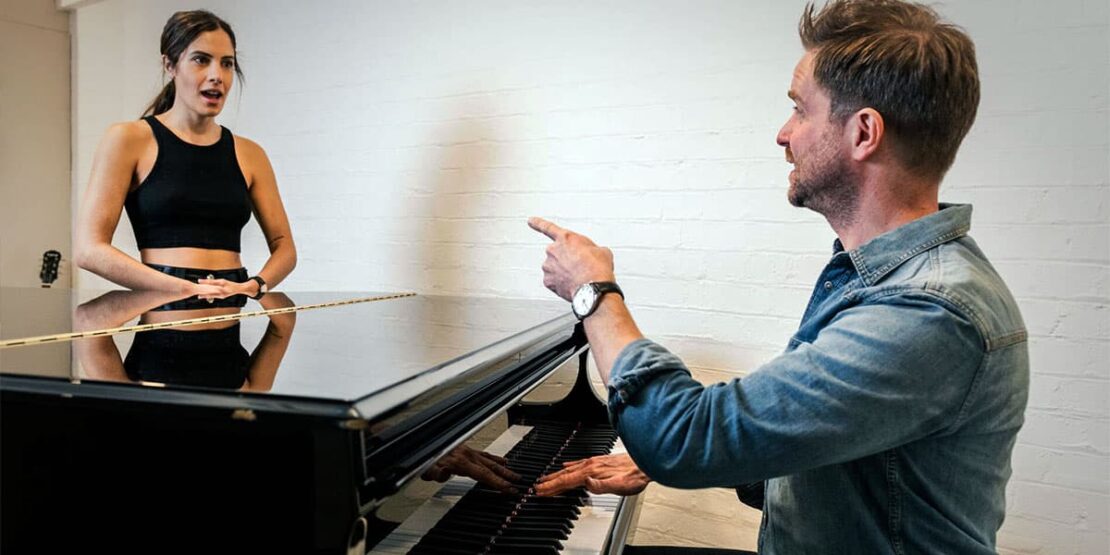Vocal training sessions are my bread and butter as a vocal coach. In these thrice-weekly meetings with students, we cover the core techniques to improve singing ability, breath control and stamina, range expansion and flexibility, and performance skills.
This article aims to give readers, especially aspiring or novice singers, an inside look at what happens during typical vocal exercises. I’ll walk you through the structure of my vocal training sessions, the methods I use to assess and develop voices, and why having an experienced teacher guide your technical and artistic development is so valuable if you want to become an accomplished, versatile vocalist, no matter your natural talent level.
The role of a vocal coach
A singing coach can be a total game-changer if you wanna level up your vocals. It’s way more than just running through scales and drills day after day. A good coach pushes you to sing your heart out during practice but also knows when you need a break. They don’t just teach you technique – though nailing those high notes and expanding your range is important. An experienced coach also pumps you up emotionally, helping you face any nervousness or self-doubt that comes up on stage. Some of the greatest trainers become true mentors, not only getting your voice performance-ready but also making sure you bring your personal flair. That unique style you have? They want you to shine. Bringing out that inner artist to connect with crowds through song – that’s what the right vocal coach strives for.

Components of a vocal training session
A singing practice needs the right combination of preparation, training, and material to help you grow. Let’s break it down…
Loosen up those pipes
You wouldn’t stretch before running a race, right? Same idea for singing. Light vocal warmups get those vocal cords tense and ready to work. We’re talking lip trills, tongue twisters, sirens – not just boring old scales. A good coach knows tons of creative ways to loosen up your voice that are kind of fun, too!
Build up that technique
Once you’re warmed up, it’s time to train your vocals like a pro. Proper breathing from the diaphragm gives you way more power and control. You also learn to use your mouth and facial muscles to nail accurate pitch and tone. It’s about precision and resonance…not just making pretty sounds. Your coach helps you master these technical elements.
Find your perfect songs
You can’t just sing any ole tune and expect it to work well. A voice teacher listens to your developing style and range so they can suggest songs that allow you to shine. The lyrics need to vibe with your interests, too. A great coach pushes you just beyond your comfort zone while making sure the material still fits. You’re not forced to sing stuff you hate… where’s the fun in that?

Beyond technique
Sure, a voice coach helps with all the technical stuff like pitch and projection. But the great ones care just as much about what’s happening inside, too. Those butterflies when you hit that high note with crazy vibrato for the first time? Your coach totally gets them. That shaky voice cracking’ when you’re scared as heck to perform your solo? They’ve been there and can talk you through it. A truly amazing vocal mentor pushes the emotional side of singing just as hard as diction and dynamics. They know the skills to move people with music come from your mind and heart too. When you vibe with them at that level, lyrics pour out authentically. Spirit moves through you, infusing each sound until you can give the audience goosebumps.
Tips for choosing a vocal coach
As a vocal coach who’s trained all types of singers, I get asked a lot about how students can find the right match. It’s like dating – you have to see if your personalities click! Here’s what I recommend seeking out:
- A coach who listens…like really listens…to the style you love and the type of artist you want to be. If they can’t vibe with your musical spirit, move along.
- Someone who still gigs and records themselves. You want their relevant experience to guide you.
- Ask if they have students out working successfully. Show how their training can prepare you for this demanding career.
- Make sure you feel totally comfortable with them. Have some deep convos and bonding moments!
- Look for someone who makes it an enjoyable adventure, too. Slogging through boring exercises kills motivation fast.
The right voice teacher gets you fired up to put in the work because you feel safe and gently pushed. You’ll just know when you find that special mentor who clicks. Now get out there and start meeting coaches!